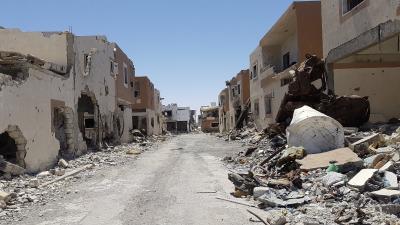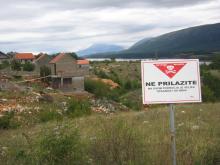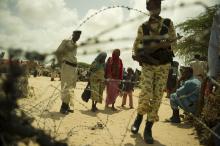Basic international humanitarian law (IHL) rules applicable to this situation:
Parties to the conflict must distinguish between civilians and combatants, and between civilian objects and military objects. Attacks may only be directed against combatants or military objectives (principle of distinction).
It is prohibited to launch indiscriminate attacks as well as attacks which may be expected to cause incidental loss of civilian life, injury to civilians, damage to civilian objects, or a combination thereof, which would be excessive in relation to the concrete and direct military advantage anticipated (principle of proportionality).
In conducting military operations, constant care must be taken to spare the civilian population, civilians and civilian objects. All feasible precautions must be taken to avoid, and in any event to minimize, incidental loss of civilian life, injury to civilians and damage to civilian objects including when choosing means and methods of warfare (principle of precautions in attack).
Parties to the conflict must do everything feasible to:
- verify that targets are military objectives.
- cancel or suspend an attack if it becomes apparent that the target is not a military objective or that it may be expected to cause disproportionate civilian harm.
The case in brief
In 2011, the North Atlantic Treaty Organization (NATO) led a military campaign against the Libyan armed forces in response to United Nations Security Council Resolution 1973. The Royal Canadian Air Force (RCAF) deployed in support of the NATO operation.
Canadian fighter pilots supporting a ground attack mission aborted a proposed airstrike because they assessed the risk of incidental civilian harm to be too high. Their actions, which demonstrated respect for the principles of distinction, proportionality and precautions in attack, may have been influenced by military ethics as well as strategic and political interests, particularly the wish to maintain public support for the Canadian operation.
IHL compliance highlights
- Aircrew involved in the RCAF military operation were able to verify military targets while airborne and cancel missions at the last minute if they deemed the risk of incidental harm to be in contravention of their rules of engagement and/or IHL more generally.
- In March 2011, two RCAF fighter jets tasked with attacking a Libyan airfield aborted the mission on arrival at the scene owing to the proximity of unknown buildings to the target. Presuming that these buildings were civilian, they opted not to drop their weapons, assessing the risk of incidental civilian harm to be too great.
Case prepared by Federica Olimpieri and Jasmine Nicolson, LL.M. students at Leiden University, under the supervision of Professor Robert Heinsch as well as Sofia Poulopoulou (PhD researcher), Johanna Trittenbach and Mahan Charmshir (research assistants), Kalshoven-Gieskes Forum, Leiden University.
A. CANADIAN PILOTS CAUTIOUS OF COLLATERAL DAMAGE IN LIBYA
[Source: The Globe and Mail, ‘Canadian pilots cautious of collateral damage in Libya’, 3 April 2011, available at https://www.theglobeandmail.com/news/world/canadian-pilots-cautious-of-collateral-damage-in-libya/article575169/]
The Canadian pilots steered their CF-18 Hornet fighter-bombers over the Libyan target with every intention of destroying it with their 225-kilogram smart bombs. But they saw something they didn't like and hesitated: Mission aborted.
"We passed," said the pilots' commanding officer, Lieutenant-Colonel Sylvain Ménard - call sign "Gogo" - referring to a mission flown shortly after the CF-18s from Bagotville, Que., arrived in Sicily on March 19. "The target we were investigating was really close to some buildings. We didn't know if they were military or civilian, so we did not drop on the target."
Returning from a combat mission with a full load of weapons is something no gung-ho pilot likes to do but it's happening often in this military action, one that pilots know is highly political and intolerant of "collateral damage," military-speak for killing civilians. The pilots say missions can be cancelled within seconds of a planned attack.
On Saturday, a warm, cloudless day in Sicily, two CF-18s returned with their bomb load intact. "We have very strict rules of engagement," said Lt.-Col. Ménard, 38, who said the Canadians are satisfied their attacks have caused no civilian casualties. "If we have any doubts, we will come back with the weapons. We are here to improve the situation, not make it worse."
[...]
Ultra-restrictive rules of engagement set out by the coalition forces are not the only factor that separates this air campaign from the Canadians' last sustained air raids, over Kosovo in 1999, where the CF-18s flew about 10 per cent of the NATO strikes. The other is what Lt.-Col. Ménard (the only pilot who was allowed to be quoted by name) called "dynamic targeting."
That means the pilots on the Libyan campaign often do not receive their target instructions until they are well on their way to Libya, and that can add to pilot stress. In Kosovo, targets such as bridges and communications infrastructure were "pre-planned," that is, they were carefully selected before the mission, leaving almost no mission flexibility.
"Right now, we are much more flexible," Lt.-Col. Ménard said. "Our decision loop is much more reactive. Sometimes we go airborne and don't have a target [at first]... Any time you have to make decisions in the cockpit, that are not on a pre-planned scenario, obviously the work load is a little more important and may be more stressful because the guys need to make a decision and assess for themselves."
[…]
B. PILOTS ABORT AIRSTRIKE OVER RISK TO CIVILIANS
[Source: CTV News, ‘Canadian pilots abort bombing over risk to civilians’, 22 March 2011, available at https://www.ctvnews.ca/canadian-pilots-abort-bombing-over-risk-to-civilians-1.621929]
Two Canadian CF-18 fighter jets took part in a mission over Libya on Tuesday morning, but returned to base without attacking their target because the risk of collateral damage was too great.
[…]
Tuesday was the second day of missions for the Canadians who are working alongside their counterparts from France, the U.K. and U.S., but it was their first bombing mission, said Maj.-Gen. Tom Lawson.
"Two CF-18s were tasked for a ground attack mission against a Libyan airfield," Lawson told a news conference in Ottawa.
"I can confirm for you that the air crew returned not having dropped their weaponry. Upon arrival on the scene of the target area the air crew became aware of a risk they deemed too high for collateral damage."
Lawson said the risk was not related to any threat to the CF-18s, but rather potential damage to civilians or important infrastructure such as hospitals, on the ground.
[...]
Given a rare show of unity from the election-wary House of Commons Monday night, Canada's role in the Libya mission enjoys the unanimous support of lawmakers, for now.
Despite their lingering questions over how long it might last, or how much it could cost, the Liberals, NDP and Bloc Quebecois all voted to support a Conservative motion endorsing Canada's role in the mission against Libyan leader Moammar Gadhafi.
[…]
C. THE CANADIAN EXPERIENCE: OPERATION MOBILE
[Source: Richard O. Mayne, ‘The Canadian Experience: Operation Mobile’, in K. P. Mueller, G. Alegi, C. F. Anrig, C. S. Chivvis, (eds.), ‘Precision and Purpose: Airpower in the Libyan Civil War’, RAND Corporation, 2015, p.246, 252-253, 255, available at https://www.jstor.org/stable/pdf/10.7249/j.ctt16f8d7x.15.pdf?refreqid=excelsior%3Af9e3b2d789a4d6dc10d9209ed4f51ecb]
[…] Parliament’s support for Canadian intervention was unanimous. As a result, all parties agreed with a mission that one opposition member described as “a perfectly legitimate operation since it is being carried out as a multilateral effort and its purpose is to protect civilian populations.”
[...]
The RCAF [Royal Canadian Air Force] first joined […] on March 21, when four CF-188s, refuelled by the two CC-150s, conducted escort and air interdiction patrols off Libya’s coastline. […] The RCAF’s second mission was equally symbolic. Canadian officials were determined to maintain a policy of zero civilian casualties, and a decision by the CF-188 pilots not to release their weapons on a targeted Libyan airfield because of fears of collateral damage immediately underscored that the RCAF was taking this responsibility quite seriously.
[...]
The CF-188 contribution to this mandate would consist of a mixture of dynamic and deliberate targeting as well as defensive counter-air operations. Also known as Strike Coordination and Reconnaissance (SCAR) and consisting of searches for targets of opportunity, most of the RCAF’s strike sorties (680 out of 944) during Op Mobile were dynamic in nature. Air Interdiction, or deliberate targeting, accounted for 212 sorties, […]. The remaining 48 sorties were classified as deliberate-dynamic targeting (DDT); a relatively new concept developed during Mobile in which pilots were prepared for a specific mission but could be retasked while airborne.
[...]
Discussion
I. Classification of the Situation and Applicable Law
1. How would you classify the situation in Libya in 2011, before the launch of Operation Mobile by Canada? Which additional information would you require in order to make such determination? (GC I-IV, Art. 2, Art. 3; PI, Art. 1; P II, Art. 1)
2. Does Canada’s involvement in Libya affect the classification of the situation? Which rules of IHL apply to the Canadian armed forces in Libya? (GC I-IV, Art. 2, Art. 3; PI, Art. 1; P II, Art. 1)
II. Conduct of Hostilities
3. Document C states that “Canadian officials were determined to maintain a policy of zero civilian casualties.” Does IHL oblige a party to avoid civilian casualties at all costs? What guidance does it provide on weighing the military advantage against anticipated civilian casualties? Is IHL automatically violated in case of civilian casualties or damage to civilian infrastructure? (P I, Art. 51, Art. 57; CIHL, Rule 14, 18)
4. In accordance with Document A, “[…] missions can be cancelled within seconds of a planned attack.” Can pre-authorised strikes be aborted while airborne? To which principle of IHL does the above statement refer? Is it applicable in both international and non-international armed conflicts? (P I, Art. 57; CIHL Rules 15, 19)
5. (Document A, C) How does dynamic targeting differ from deliberate targeting? Do IHL principles and standards apply in the same manner? Are there any differences? Does dynamic targeting bring flexibility to targeting operations? (P I, Art. 51, Art. 57; CIHL Rules 1, 15, 18, 19)
III. Elements Contributing to Respect for IHL
6. (Document A) What are rules of engagement (ROEs)? Are they required under IHL? In your opinion, can ‘ultra strict’ ROEs influence positively the behaviour of parties to the conflict? Do you think ‘dynamic targeting’ methods could help armed forces to comply with their IHL obligations?
7. (Document A) How could previous experiences, such as in Kosovo, positively impact future military operations?
8. (Documents B and C) What was the influence, if any, of the Canadian Parliament’s ‘unanimous support’ to Operation Mobile on the mission’s targeting decisions? Could the characterization of the operation as ‘perfectly legitimate’ constitute an incentive to further respect of IHL by the armed forces?
9. (Documents A and C) Having regard to Lieutenant-Colonel Sylvain Ménard’s statement, “[…] We are here to improve the situation, not make it worse”, do you agree with the assessment that the decision to abort the mission shows that “the RCAF was taking this responsibility quite seriously”? If yes, do you think it might have impacted the decision to abort the mission?
10. (Document B) What is the significance, if any, of Canadian pilots operating alongside their counterparts from France, the U.K. and U.S? Can partnered military operations facilitate compliance with IHL obligations? Why? Why not?






